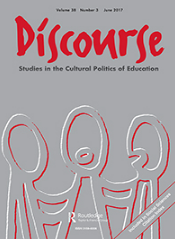
GCED Basic Search Form
Quick Search
Close
أنت هنا
الموارد
Translating globalization theories into educational research : thoughts on recent shifts in Holocaust education

Much educational research on globalization aims to prepare students to be successful citizens in a global society. We propose a set of three concepts, drawing on systems theory (Nassehi, Stichweh) and theories of the subject (Butler, Foucault), to think the global which enables educational research to step back from hegemonic discourses and reflect on current practices. Globalization is understood in this approach as referring to: (1) a cognitive shift; (2) expanding relevancy spaces; and (3) new forms of subjectivation. The framework is illustrated with examples from educational policy and learning materials, with an extended look at how globalization is articulated in recent shifts in Holocaust education. (By the author)
نوع المصدر:
الأوراق البحثية/ مقالات المجالات
الموضوعات:
المواطن/ المواطنة / الديمقراطية
العولمة والعدالة الاجتماعية / التفاهم الدولي
مستوى التعليم:
التعليم الابتدائي
التعليم الثانوي
التعليم العالي
الكلمات المفتاحية:
Holocaust
globalization
